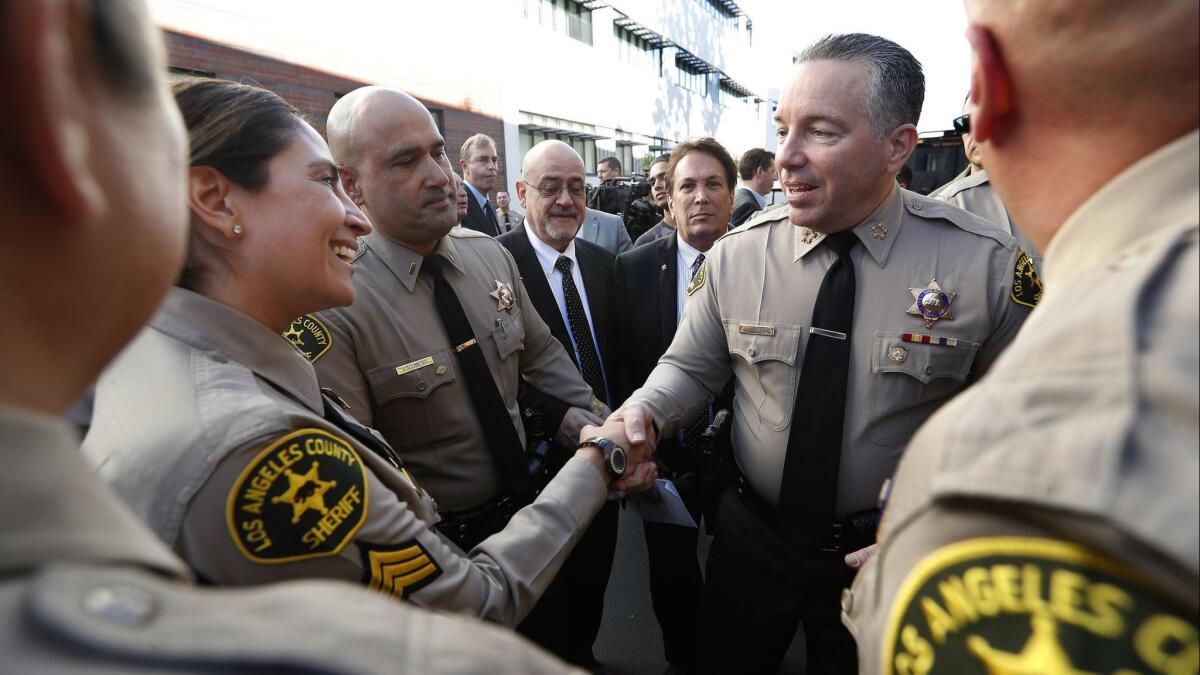Editorial: L.A. supervisors are being far too deferential to the sheriff on deputy discipline

- Share via
It is good that Supervisors Kathryn Barger and Sheila Kuehl want to look into Sheriff Alex Villanueva’s troubling reinstatement of a deputy who had been fired on allegations of domestic violence. On Tuesday the full Board of Supervisors would be wise to adopt their motion, which calls on county lawyers to tell them how to deal with conflicts between the supervisors and the sheriff, all of whom are independently elected officials.
But the board should go further, examining Villanueva’s views more generally about disciplining sheriff’s deputies and his role in it. To understand why that is important, all the supervisors have to do is listen to the sheriff’s startling defense of his actions and his statements to an oversight commission about the county’s entire structure of employee discipline. They will hear Villanueva make the astounding assertion that deputies should not be fired for domestic violence — or perhaps for any misconduct, although he was less clear on that point — unless criminal charges have been brought. They will hear him say that law enforcement officers should not be fired for actions unrelated to their employment.
They will hear him call county civil service hearings a “kangaroo court” and assert that fact-finders and decision-makers are “directed” to make particular rulings or are offered “financial incentives to do so.”
Villanueva has made some serious allegations about the integrity of the county employee discipline system and about his power to override it.
And then they will understand the scope of the problem they have on their hands. Either they have to overhaul the county civil service system for the second time in several years, or they have to gear up for a series of conflicts with a sheriff who apparently believes he was put in office by voters to ease up on problem deputies.
The Barger-Kuehl motion was sparked by Villanueva’s rehiring of Caren Carl Mandoyan, a deputy who had been fired following allegations of domestic violence and who later played a key role in Villanueva’s successful campaign against incumbent Jim McDonnell.
Villanueva told the Civilian Oversight Commission that he rehired Mandoyan after consulting with top Sheriff’s Department staff and county lawyers. When commission members learn what he knows about the situation, he told them, they’ll see that the decision was a “no-brainer.”
But there’s a two-fold problem, and Villanueva appears to be missing at least half of it. The issue is not simply domestic violence and its long and troubled history in law enforcement agencies. It’s also the sheriff’s belief that he has the right and duty, on his own initiative and with no oversight, to rehire a person whose firing was upheld on appeal. Any other department head who doesn’t like a Civil Service Commission decision has to go to court and see if a judge agrees. But if Villanueva is allowed to proceed his way, the county is in danger of replacing its civil service process with an old-school spoils system, in which elections determine not only who’s the boss but who gets to wear a deputy’s badge.
Like other civil service systems, L.A. County’s was established to ensure that department chiefs and managers could not retaliate against workers for personal, political or other inappropriate reasons. And in fact, the county’s system did have some serious problems — but they were the opposite of those that Villanueva claims. The system was too lax on employees — especially sheriff’s deputies, who ought to meet a higher standard than other departments’ workers but who nevertheless are protected by a host of procedures that apply only to law enforcement officers.
The county was long represented in disciplinary proceedings by poorly trained or insufficiently skilled advocates who failed to competently defend terminations or other discipline decisions. That meant that employees with good lawyers, often provided by their labor unions, could readily win reinstatement at the preliminary stage or when appealing to the full Civil Service Commission, whose members are appointed by labor-friendly supervisors.
Enter the Fray: First takes on the news of the minute »
As sheriff, McDonnell said he would terminate deputies for misconduct, only to be forced to take them back when the county failed to adequately defend his decisions in hearings.
The Board of Supervisors addressed the problem by requiring better training for advocates and hearing officers. Now a few terminations that formerly would have been overturned were upheld — including Mandoyan’s, by a unanimous Civil Service Commission.
Villanueva has made some serious allegations about the integrity of the county employee discipline system and about his power to override it. The supervisor’s motion should seek a full investigation and a public response: Is the county civil service process truly corrupt? Or is the new sheriff simply clueless?
Follow the Opinion section on Twitter @latimesopinion and Facebook
More to Read
A cure for the common opinion
Get thought-provoking perspectives with our weekly newsletter.
You may occasionally receive promotional content from the Los Angeles Times.









